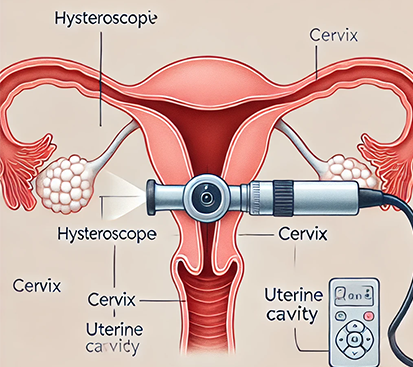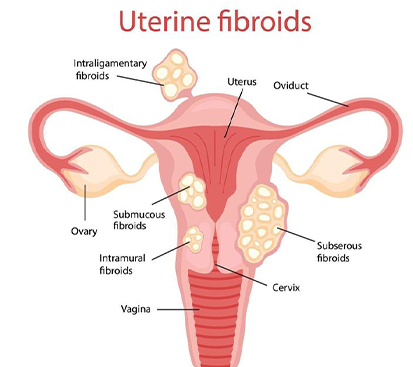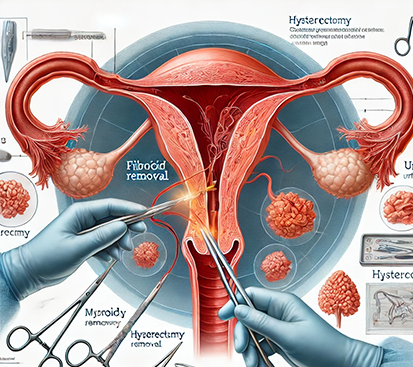
Fibroid uterus, also known as uterine fibroids, are non-cancerous tumors that form in or around the uterus. These growths are composed of muscle and fibrous tissue, varying in size from small nodules to large masses that can alter the shape of the uterus. While some women may not experience symptoms, others may face discomfort, heavy bleeding, or fertility issues. Early diagnosis and timely treatment are essential to manage fibroids effectively and prevent complications.
At our specialized fibroid treatment hospital in Kolathur and fibroid clinic in Mogappair, we offer advanced diagnostic tools and customized treatment plans to manage fibroids. Our expert team ensures comprehensive care, helping patients achieve better reproductive health and overall well-being.
The exact cause of fibroid development is not fully understood, but several factors are believed to increase the risk. Hormonal imbalance, particularly elevated levels of estrogen and progesterone, can stimulate fibroid growth. Genetic predisposition also plays a role, making women with a family history of fibroids more susceptible. Additionally, pregnancy can trigger fibroid growth due to hormonal changes. Factors such as obesity, which leads to increased estrogen production, and lifestyle choices like poor diet, stress, and lack of exercise may also contribute to the development of fibroids. Identifying these risk factors can help in early detection and management of the condition.
The symptoms of fibroid uterus can vary significantly depending on the size, location, and number of fibroids present. While some women may experience no noticeable symptoms, others may face severe discomfort that affects their daily life and overall health. Understanding these symptoms is crucial for early diagnosis and timely treatment
One of the most common signs of fibroids is heavy or prolonged menstrual bleeding. Women with fibroids may experience periods that last longer than usual, often accompanied by blood clots. This excessive bleeding can sometimes lead to anemia, causing fatigue, weakness, and dizziness. In addition to menstrual irregularities, pelvic pain and pressure are common complaints, particularly when fibroids grow large enough to press against surrounding organs.

Other symptoms may include frequent urination, especially if fibroids exert pressure on the bladder, reducing its capacity. Conversely, fibroids that press against the rectum may cause constipation or difficulty with bowel movements. Some women may also experience lower back pain or leg pain if the fibroids compress nearby nerves.In severe cases, fibroids can lead to abdominal swelling, making the stomach appear bloated or enlarged. For women trying to conceive, fibroids may contribute to infertility or complications during pregnancy, such as miscarriage or premature labor. If you experience any of these symptoms, seeking prompt medical care at our fibroid treatment hospital in Kolathur or fibroid clinic in Mogappair can help in early diagnosis and effective management of the condition.
Surgical treatment is often necessary when fibroids lead to persistent symptoms that interfere with daily life or pose a risk to reproductive health. While some fibroids may respond well to medications or other non-surgical treatments, conditions may require surgical intervention for effective relief and improved well-being. Identifying the need for surgery early can prevent further complications and ensure better long-term outcomes.
Surgery is typically recommended when heavy menstrual bleeding becomes severe and leads to anemia, a condition characterized by low red blood cell count, causing fatigue, weakness, and dizziness. Persistent pelvic pain or pressure that worsens with movement or prolonged standing may also indicate the need for surgical treatment, especially when it disrupts daily activities. Women experiencing noticeable abdominal swelling or bloating due to fibroid growth may require surgical intervention to restore comfort and improve quality of life.


For women struggling with fertility concerns, fibroids that interfere with the uterus or fallopian tubes may hinder conception. In such cases, surgery can improve the chances of successful pregnancy. Similarly, recurrent miscarriages linked to fibroids may require surgical removal to improve uterine health and enhance fertility. Additionally, fibroids that exert pressure on the bladder or bowel can cause discomfort, frequent urination, or constipation, further emphasizing the need for surgical intervention.
In cases where non-surgical treatments fail to provide adequate relief, surgery becomes a viable solution to manage severe or persistent symptoms. At our fibroid treatment hospital in Kolathur and fibroid clinic in Mogappair, our expert surgeons specialize in performing advanced surgical procedures such as:
Our experienced specialists ensure personalized care plans, advanced surgical techniques, and post-operative support to promote faster recovery, enhanced comfort, and improved quality of life. If you are experiencing persistent fibroid symptoms, consult our expert team for tailored treatment solutions that address your specific needs.
Accurate diagnosis is crucial for determining the severity of fibroids and identifying the best treatment plan. At our specialized fibroid treatment hospital in Kolathur and fibroid clinic in Mogappair, we use advanced diagnostic tools such as ultrasound, MRI scans, and hysteroscopy for precise evaluation.
- Medications to regulate hormones and reduce fibroid size
- Pain Management Medications to relieve pelvic discomfort
- Hormonal Therapies to control heavy menstrual bleeding
- Uterine Artery Embolization (UAE) to shrink fibroids by cutting off their blood supply
- Laparoscopic Myomectomy for minimally invasive fibroid removal with faster recovery
- Hysteroscopic Myomectomy to remove fibroids located inside the uterine cavity
- Hysterectomy (uterus removal) for severe cases or recurrent fibroids
- Post-Treatment Care to monitor recovery and prevent recurrence

Our dedicated medical team designs personalized treatment plans to address each patient's unique condition. Whether through medications, minimally invasive procedures, or advanced surgical methods, we aim to provide effective solutions that improve comfort, reproductive health, and overall well-being.
For expert diagnosis and advanced treatment of fibroid uterus, visit our trusted fibroid treatment hospital in Kolathur or fibroid clinic in Mogappair for specialized care and improved quality of life.